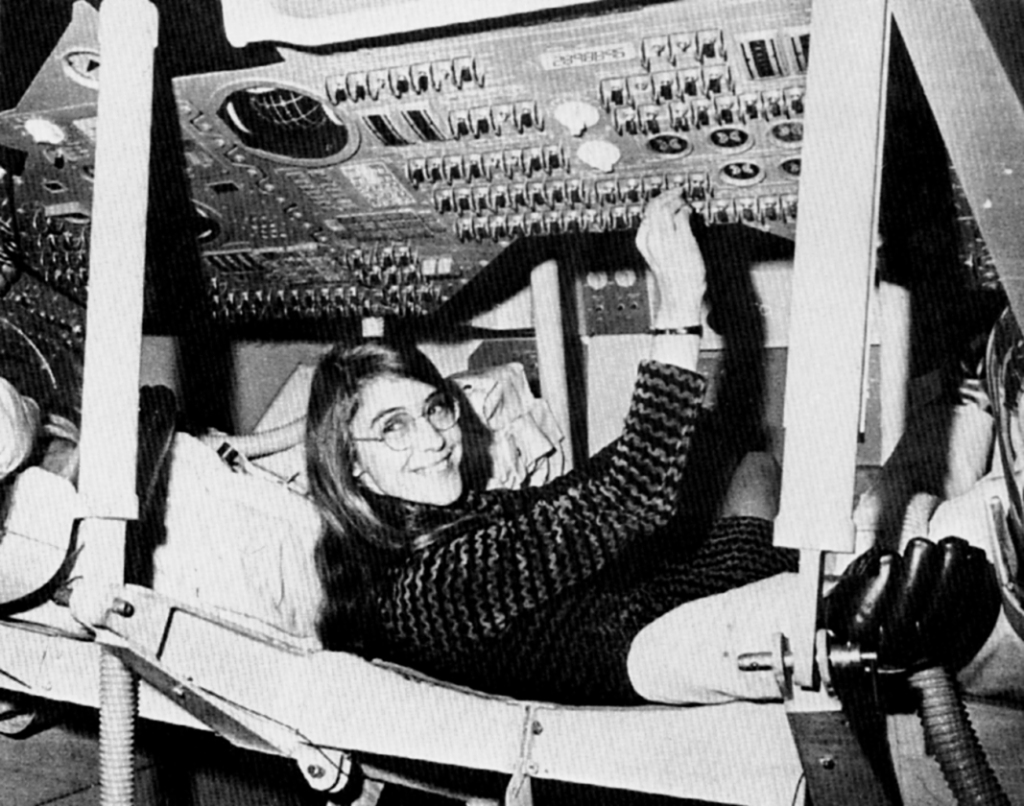
Moonpreneur
According to a recent report, only 22 percent of young girls participate in the Advanced Placement exam in Computer Science held in US High schools. This gender gap problem extends to university programs as well.

Margaret Hamilton was one of the first female coders who contributed to the Apollo 11 mission Image: MIT
Why?
Because most parents have a tendency to steer their daughters toward safe and familiar activities like music, dance, or gymnastics while encouraging sons to explore more complex and challenging skills. Most of them feel that women don’t do better in technical fields. Github’s report has a slightly different take on this.
![]()
According to this report, open-source codes written by women have high approval rate than codes written by men, but only if women don’t disclose their gender while submitting the codes.
It would be fair to say that lack of awareness, prejudices, and negligence lead to this disparity.
But what if I told you that the first computer programmer in the world was a woman?
Yes, a woman named Ada Lovelace paved the way for what we call a “male-dominated industry” today.
Recommended Reading: Is Coding Hard? Understanding the Challenges and Overcoming Them
In this article, we’ll take you through the journey of Ada Lovelace and other technical mavericks who made us proud and helped many other women make their mark in the computing world.
Women Programmers Who Made Us Proud
1. Ada Lovelace
“That brain of mine is something more than merely mortal, as time will show.”
Ada Lovelace, born Augusta Ada Byron in 1815, was an English mathematician and writer. Ada Lovelace’s best-known project was her work on Charles Babbage’s Analytical Engine. She wrote extensive notes on the engine, including a sequence of operations for calculating Bernoulli numbers, often considered the first computer program. Lovelace also envisioned the potential of computers beyond mere calculation and foresaw their ability to create complex graphics and music.
In addition to her work on the Analytical Engine, Lovelace collaborated with Charles Wheatstone on developing the first telegraph system and wrote several scientific papers, including a paper on the mathematical principles of flight, which was published in the journal “Flyology.”
Lovelace’s contributions to mathematics and computing were groundbreaking for her time, and she remains an inspiration to scientists and mathematicians today.
Recommended Reading: 5 Important Life Skills Kids Learn from Coding
2. Grace Hopper
“I’ve always been more interested in the future than in the past.”
Grace Hopper was an American computer scientist and Navy Rear Admiral. She is known for her contributions to developing early programming languages, including the COBOL programming language, which is still used today.
During World War II, Hopper served as a member of the United States Navy Reserve, where she worked on the Harvard Mark I computer and developed the first compiler, which translated mathematical code into machine-readable code. Hopper’s work on the Mark I and subsequent computers helped to usher in the era of modern computing and programming languages.
Hopper was also a trailblazer for women in computer science, serving as a mentor and advocate for women in the field throughout her career.
To keep her legacy alive, the Anita Borg Institute for Women and Technology launched the “Grace Hopper Conference” in 1994 to connect women and non-binary people in technology.
3. Dame Stephanie Shirley
“We waste too much time being afraid when what we should really fear is wasting time.”
Best known for founding a software company, “Freelance Programmers Ltd,” Dame Stephanie Shirley is a pioneering figure in the development and commercialization of software, as well as a philanthropist and advocate for women in science.
At a time when women in the technology industry were a rarity, Shirley founded her company with the goal of giving women the opportunity to work in computing, coding, and programming.
Shirley’s company was a trailblazer in its use of remote working and flexible working hours. This approach to work was considered innovative at the time, and it helped Freelance Programmers attract talented employees who might not otherwise have had the opportunity to work in the technology industry.
Shirley’s work at Freelance Programmers had a significant impact on the technology industry in the UK and beyond. Her contributions to business, philanthropy, and technology have earned her numerous awards and honors, including a Dame Commander of the Order of the British Empire (DBE).
4. Radia Perlman
“The kind of diversity that I think really matters isn’t skin shade and body shape, but different ways of thinking”
Radia Perlman is an American computer programmer. She earned her moniker “Mother of the Internet” for her work on the Spanning Tree Protocol (STP), a method of connecting computer networks that solved a challenging information routing problem. She also designed and implemented several network protocols, including TRILL.
Perlman has also made significant contributions to the development of network security protocols and was the author of the first publication to describe how to use cryptography to protect the Internet. She has been awarded numerous patents for her inventions in the field of computer networking, and 2016, she was inducted into the National Inventors Hall of Fame.
She was also listed as one of the 20 most influential people in information technology by Data Communications Magazine in its 25th Anniversary edition.
Perlman has worked for a number of companies in the technology industry, including Digital Equipment Corporation (DEC) and Sun Microsystems, and she has also taught computer science at various universities.
5. Anita Borg
“If we want technology to serve society rather than enslave it, we have to build systems accessible to all people – be they male or female, young, old, disabled, computer wizards or technophobes”
The founder of the Institute for Women and Technology and the Grace Hopper Celebration of Women in Computing, Anita Borg was an American computer scientist, entrepreneur, and advocate for women in technology. She is best known for promoting diversity and inclusivity in the technology industry.
Borg’s career in technology began in the 1970s, and she went on to work for a number of technology companies, including Digital Equipment Corporation (DEC) and Xerox PARC. In 1987, she founded the Systers mailing list, designed to provide a supportive community for women in computing. This community later became the basis for the Anita Borg Institute.
In 2002, Anita Borg received the 8th Heinz Award for Technology, the Economy, and Employment for her visionary role in creating and sustaining innovative programs for women in computer science.
These five women are some of the most influential programmers of all time and have made significant contributions to the advancement of computer science. They have paved the way for future generations of female programmers and will continue to inspire them.
By encouraging girls to explore coding and other STEM fields, parents can empower their daughters to pursue their passions and potential.
Moonpreneur is on a mission to disrupt traditional education and future-proof the next generation with holistic learning solutions. Its Innovator Program is building tomorrow’s workforce by training students in AI/ML, Robotics, Coding, IoT, and Apps, enabling entrepreneurship through experiential learning.



























Some strong women programmers you should add to your blog are: Adele Goldberg, Margaret Hamilton and Carol Shaw.
I have always heard that a career in programming is not suitable for women, how much is this true?
We all should know that gender bias is bad for individuals, organizations, and economies. Programming can be an immensely fulfilling career path for women, providing excellent prospects for career advancement and financial success, all while contributing new perspectives and creativity to the technology sector.